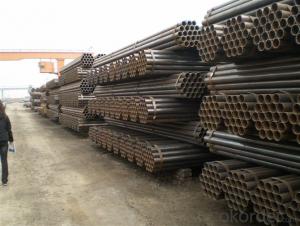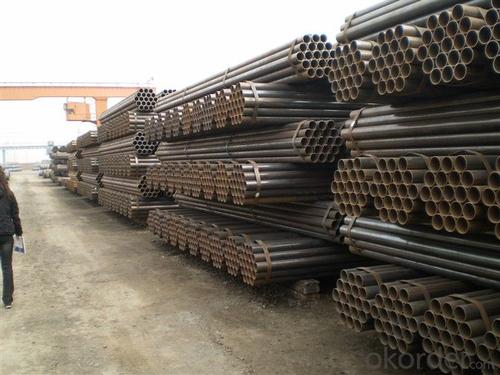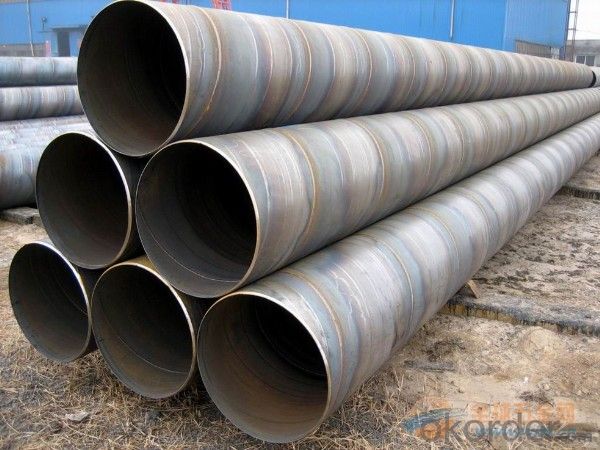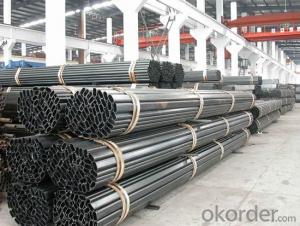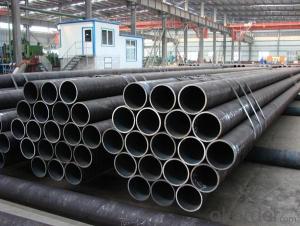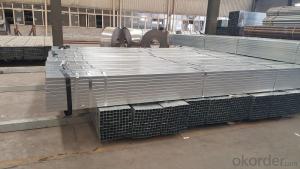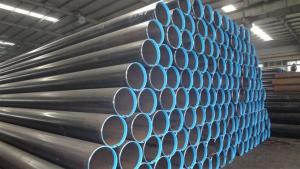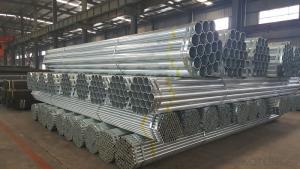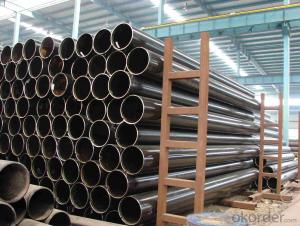New welded steel pipe production serious
- Loading Port:
- Tianjin
- Payment Terms:
- TT OR LC
- Min Order Qty:
- 25 m.t.
- Supply Capability:
- 7000 m.t./month
OKorder Service Pledge
OKorder Financial Service
You Might Also Like
1、Structure of welded steel pipe ASTM AL5:
Welded pipe is formed by drawing a solid billet over a piercing rod to create the hollow shell.We can provide you any size of pipe and according to your requirement and we can meet your demand.
2、Main Features of the welded steel pipe ASTM AL5:
• High manufacturing accuracy
• Harder strength
• Small inertia resistance
• Strong heat dissipation ability
• Good visual effect
• Reasonable price
3、Welded steel pipe AL5 Specification:
Standard | GB, DIN, ASTM ASTM A106-2006, ASTM A53-2007 |
Grade | 10#-45#, 16Mn 10#, 20#, 45#, 16Mn |
Thickness | 8 - 33 mm |
Section Shape | Round |
Outer Diameter | 133 - 219 mm |
Place of Origin | Shandong, China (Mainland) |
Secondary Or Not | Non-secondary |
Application | Hydraulic Pipe |
Technique | Cold Drawn |
Certification | API |
Surface Treatment | factory state or painted black |
Special Pipe | API Pipe |
Alloy Or Not | Non-alloy |
Length | 5-12M |
Outer Diameter | 21.3-610mm |
Grade | 20#, 45#, Q345, API J55, API K55, API L80, API N80, API P110, A53B |
Standard | ASME, ASTM |
1) Material:20#(ASTM A 106/A53 GRB.API5LGRB,GB),45#,16Mn,10#.
2) Specification range:OD:21.3-610mm,WT:6-70mm,length:6-12m or according to the requirement of clients.
3) Excutive standards:GB,ASME API5L.ASTM A 106/A53,Despite of the above standards,we can also supply seamless steel pipe with standard of DIN,JIS,and so on,and also develop new products according to the requirements of our clients!
4) Surface:black lacquered,varnish coating or galvanized.
5) Ends:Beveled or square cut,plastic capped,painted.
6) Packing:bundles wrapped with strong steel strip,seaworthy packing.
4、Packaging & Delivery
Packaging Details: | seaworthy package,bundles wrapped with strong steel strip |
Delivery Detail: | 15-30days after received 30%TT |
5、FAQ of welded steel pipe ASTM AL5:
①How is the quality of your products?
Our products are manufactured strictly according to national and internaional standard, and we take a test
on every pipe before delivered out. If you want see our quality certifications and all kinds of testing report, please just ask us for it.
Guaranteed: If products’ quality don’t accord to discription as we give or the promise before you place order, we promise 100% refund.
②How about price?
What we are doing is to be China No.1 supplier company and sure what we can give you is not only the best price.
③Why should you chose us?
Chose happens because of quality, then price, We can give you both.Additionally, we can also offer professional products inquiry, products knowledge train(for agents), smooth goods delivery, exellent customer solution proposals.Our service formula: good quality+good price+good service=customer’s trust
SGS test is available, customer inspection before shipping is welcome, third party inspection is no problem.
6、welded steel pipe ASTM AL5 Images:
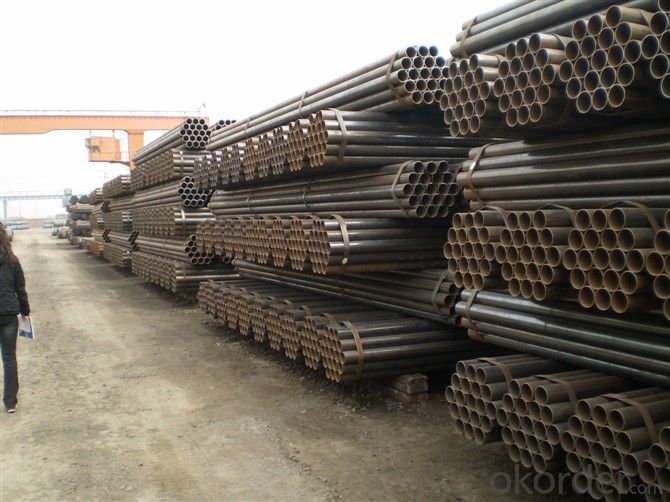
- Q: How are steel pipes used in the construction of wastewater treatment plants?
- Steel pipes are commonly used in the construction of wastewater treatment plants for various purposes, such as transporting and distributing water, chemicals, and sludge within the facility. They are also used for constructing the main drainage systems, including sewer lines, stormwater drains, and effluent pipes, ensuring efficient and reliable flow of wastewater. Additionally, steel pipes are utilized for constructing the structural framework of treatment units, such as settling tanks, clarifiers, and aeration systems, providing stability and durability to withstand the harsh conditions of wastewater treatment processes.
- Q: How do you solder purple copper plate and steel tube?
- When the copper and copper tube size is too large, argon welder welding, DC argon arc welding machine, of course, when DC argon arc welding welding belongs to welding, argon arc welding of brass with Wei Odin 204S welding, the argon arc welding wire for gas welding is not brass wire, this concept must be clear, the wire diameter of 2 80-120A, welding current parameters, if the copper thickness is relatively thick, with a red copper welding after welding preheating in advance.
- Q: What is the difference between hot dip galvanized steel pipe and galvanized steel pipe?
- Galvanized steel pipe is commonly known as "cold plated tube", using electroplating process, only galvanized steel pipe in the outer wall, the wall of the pipe is not galvanizedHot dip galvanized steel pipe adopts hot-dip galvanizing process, and the inner and outer walls of the steel pipe have zinc coating.
- Q: What are the alternatives to steel pipes for various applications?
- There are several alternatives to steel pipes for various applications. Some common alternatives include pipes made from materials such as plastic (polyvinyl chloride or PVC), copper, cast iron, and ductile iron. Each alternative offers different benefits and drawbacks depending on the specific application, cost, durability, and environmental considerations.
- Q: How are steel pipes insulated for thermal efficiency?
- Steel pipes are insulated for thermal efficiency by applying a layer of insulating material, such as mineral wool or foam, around the pipe. This insulation helps to reduce heat transfer and prevent energy loss, ensuring that the pipes maintain the desired temperature and improve overall thermal efficiency.
- Q: Can steel pipes be used for fire protection systems?
- Yes, steel pipes can be used for fire protection systems. Steel pipes are commonly used in fire sprinkler systems because they have high strength and durability, making them suitable for carrying pressurized water to extinguish fires. Steel pipes also have fire-resistant properties, which further enhances their suitability for fire protection systems.
- Q: What are the common methods for inspecting the condition of steel pipes?
- There are several common methods for inspecting the condition of steel pipes. These methods aim to identify any defects or potential issues that could affect the integrity of the pipes. 1. Visual Inspection: This involves a thorough visual examination of the pipes to identify any visible signs of damage such as corrosion, cracks, or leaks. Inspectors may use tools such as flashlights, mirrors, or borescopes to access hard-to-reach areas. 2. Ultrasonic Testing: This method uses high-frequency sound waves to detect defects within the steel pipes. A transducer is used to emit sound waves, and any disruptions or reflections in the waves can indicate potential issues such as cracks or thinning of the pipe walls. 3. Magnetic Particle Testing: This technique is primarily used to detect surface cracks or defects in steel pipes. A magnetic field is applied to the pipe, and fine iron particles are then applied to the surface. The particles will gather at any areas where there are surface defects, making them easily visible. 4. Eddy Current Testing: This non-destructive testing method is used to detect surface and near-surface defects in steel pipes. It involves passing an alternating current through a coil, which induces eddy currents in the pipe. Any disruptions or changes in the eddy currents can indicate defects such as corrosion or cracks. 5. Radiographic Testing: This method uses X-rays or gamma rays to inspect the internal structure of steel pipes. X-ray film or a digital detector is placed on one side of the pipe, while the X-ray source is placed on the other side. The rays penetrate the steel, and any irregularities or defects can be identified on the film or through digital imaging. 6. Dye Penetrant Inspection: This technique is used to detect surface-breaking defects in steel pipes. A dye penetrant is applied to the surface of the pipe, and after a specified period, a developer is used to draw out the dye from any defects. The dye will make the defects easily visible. These methods, either individually or in combination, provide a comprehensive inspection of steel pipes, ensuring their reliability and safety in various industries such as oil and gas, construction, and manufacturing.
- Q: How are steel pipes repaired if they develop leaks?
- Steel pipes can be repaired if they develop leaks through various methods such as welding, clamping, or using epoxy compounds. The specific repair technique depends on the size and location of the leak as well as the type of pipe, and it is typically carried out by trained professionals with the necessary equipment and expertise.
- Q: How are steel pipes used in automotive manufacturing?
- Steel pipes are widely used in automotive manufacturing for various purposes. One of the primary applications of steel pipes in this industry is for the exhaust system. The exhaust system in vehicles is responsible for the safe removal of harmful gases produced during the combustion process. Steel pipes are used to create the exhaust manifold, which collects the exhaust gases from the engine cylinders and directs them towards the exhaust pipe. Furthermore, steel pipes are also used in the manufacturing of the chassis and frame of vehicles. The chassis provides structural support and helps maintain the overall strength and stability of the vehicle. Steel pipes, due to their high strength and durability, are ideal for creating the chassis and frame. These pipes are often welded together to form a rigid and robust structure that can withstand various forces and impacts. Additionally, steel pipes find applications in the suspension system of automobiles. The suspension system is responsible for providing a comfortable and smooth ride by absorbing shocks and vibrations. Steel pipes are used in the manufacturing of suspension components such as control arms, tie rods, and sway bars. These components help maintain the stability, handling, and overall performance of the vehicle. Moreover, steel pipes are utilized in the fuel system of automobiles. They are used to transport fuel from the fuel tank to the engine. These pipes need to be resistant to corrosion and have high tensile strength to ensure the safe and efficient delivery of fuel. In conclusion, steel pipes play a crucial role in automotive manufacturing. They are used in various applications such as the exhaust system, chassis and frame construction, suspension system, and fuel system. The use of steel pipes in these areas ensures the durability, strength, and performance of vehicles while maintaining safety and efficiency.
- Q: How are steel pipes used in the manufacturing of pharmaceutical equipment?
- Steel pipes are commonly used in the manufacturing of pharmaceutical equipment for various purposes such as transferring fluids, gases, and chemicals, as well as providing structural support to the equipment. These pipes are known for their durability, corrosion resistance, and ability to withstand high pressure, making them ideal for ensuring the safe and efficient operation of pharmaceutical machinery.
Send your message to us
New welded steel pipe production serious
- Loading Port:
- Tianjin
- Payment Terms:
- TT OR LC
- Min Order Qty:
- 25 m.t.
- Supply Capability:
- 7000 m.t./month
OKorder Service Pledge
OKorder Financial Service
Similar products
Hot products
Hot Searches
Related keywords
